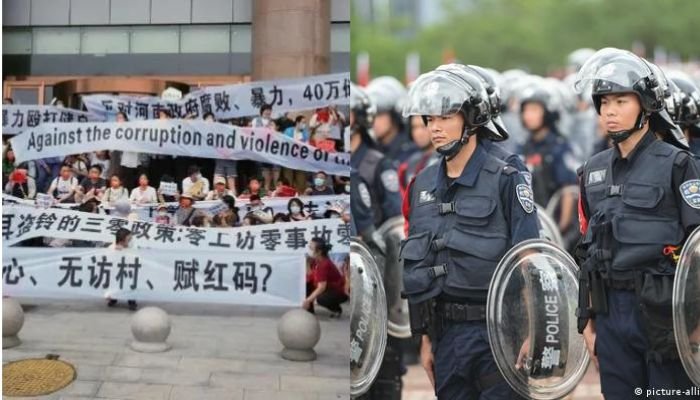Police in China have arrested 234 suspects allegedly involved in a rural banking scandal, a month after hundreds of depositors protested over their lost savings in one of the largest demonstrations the country has seen since the pandemic began.
Four banks in central China Henan province suspended cash withdrawals in April as regulators cracked down on mismanagement, freezing the funds of hundreds of thousands of customers and sparking protests that at times ended in violence.
Police said they had now arrested 234 people in connection with the scandal and that “significant progress” was being made in recovering stolen funds.
“A criminal gang… illegally controlled four village and town banks… and was suspected of committing a series of serious crimes,” police in the city of Xuchang said in a statement on Monday.
it said a criminal gang led by the alleged mastermind, Lv Yi, took control of four rural banks including Yuzhou Xinminsheng Village Bank, luring depositors with promises of annual returns as high as 18%.
Anguished depositors have staged several demonstrations in the city of Zhengzhou, Henan’s provincial capital, over the past two months to demand their savings back, but their calls had fallen on deaf ears.
In July, more than 1,000 depositors from across China gathered outside the Zhengzhou branch of the country’s central bank, the People’s Bank of China, to launch their largest protest yet. The peaceful demonstration was crushed violently by authorities, with police and plain-clothed security personnel forcefully dispersing protesters.
Following the protest, Henan’s financial regulator said depositors would be refunded, with the first payments being sent to bank customers with a combined total of less than 50,000 yuan ($7,200) deposited at a single bank.
On Monday, the financial authorities said they would launch another round of repayments to customers, this time focusing on those with deposits of between 400,000 yuan ($57,800) and 500,000 yuan ($72,200).
Depositors who have lost more would receive an initial sum of 500,000 yuan with the remainder reserved for now, according to the regulators.
“After this round of repayments, the centralized repayment work will be largely completed, and further matters will be dealt with by the four rural banks,” the statement said.
Runs on small Chinese banks have become more frequent in recent years and some have been accused of financial improprieties or corruption. But experts worry that a much bigger financial problem could be looming, caused by fallout from a real estate crash and soaring bad debts related to the Covid-19 pandemic.
About a quarter of the total assets in China’s banking system are held by around 4,000 small lenders, which often have opaque ownership and governance structures and are more vulnerable to corruption and the sharp economic slowdown.



